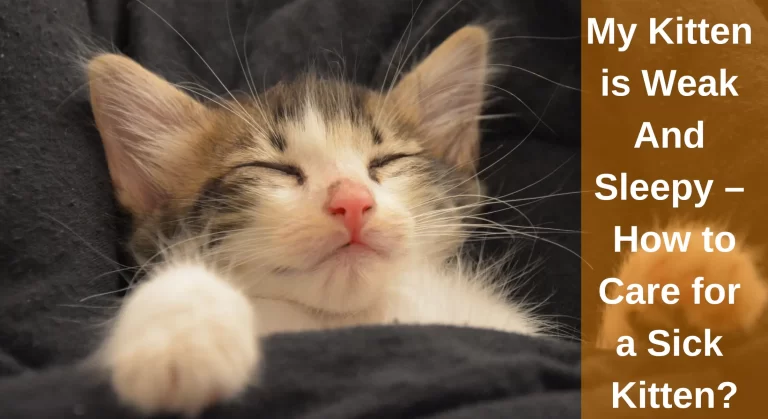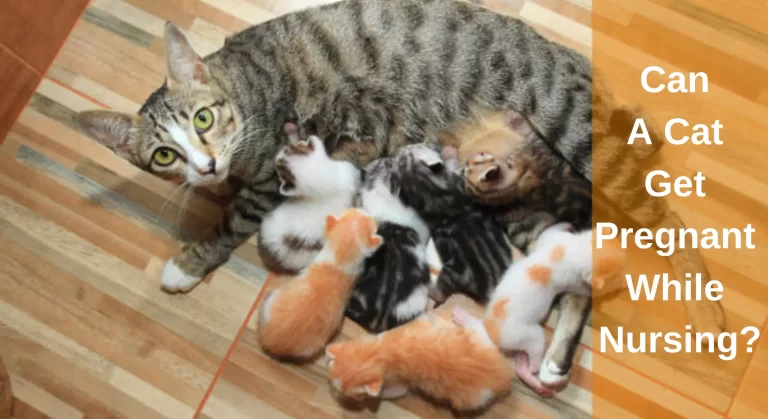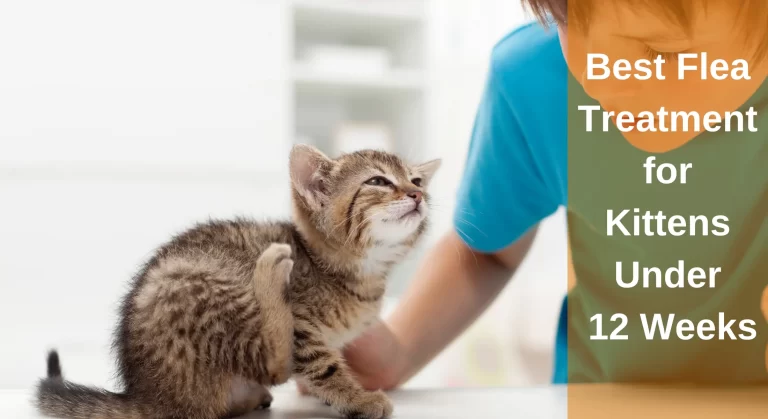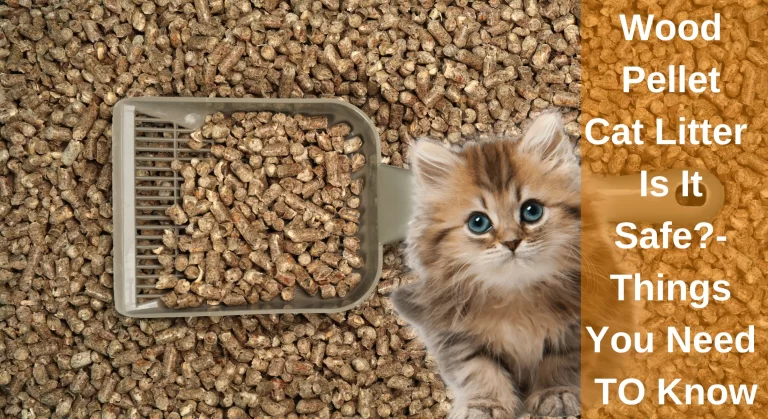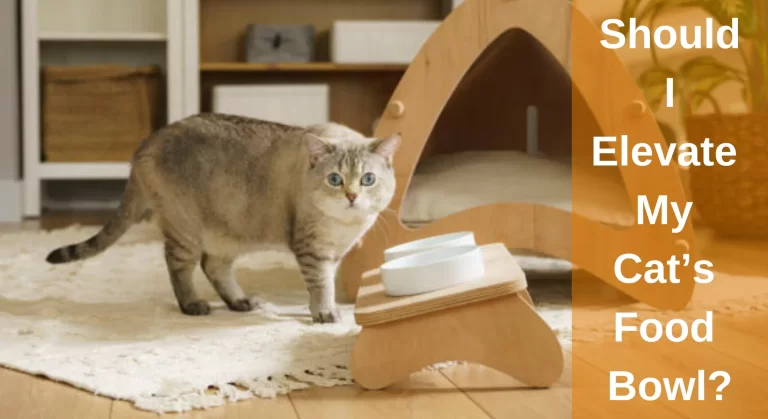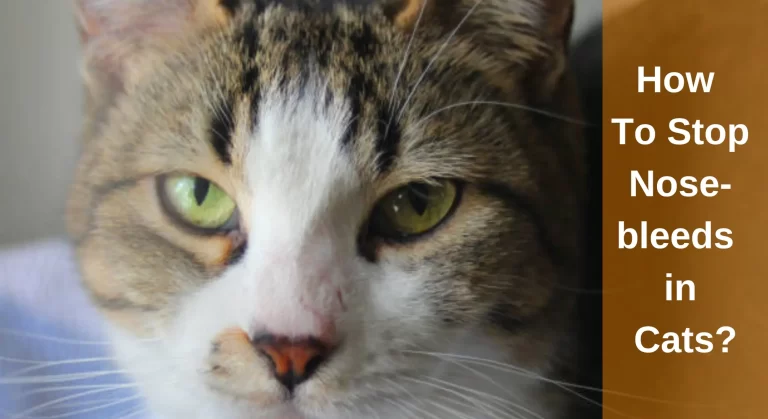Why Is My Cat Keeping One Eye Closed? Cat Squinting One Eye
Cats are inherent predators, and whenever they aren’t dozing off in their preferred position, they’re constantly scanning their surroundings with their eyes widely opened. You may become panic if you see your feline with one closed eye and wonder why she is doing this. Why Is my cat keeping one eye closed?
Your feline may close an eye when it is irritated or may be due to illness if it’s rubbing its eyes shut. If your cat’s eyes are red, stinging eyes signify conjunctivitis, also known as pink eye. Your feline may have glaucoma if one of its eyes is swollen. Check your cat’s iris for signs of cataracts or ulcers that might also be the reason for the cat’s closed eye.
It is important to be aware of the signs and therapies for eye problems considering that they must be treated before they get worsen. But it might be difficult for you to detect cat eye infections. So, for your convenience, we’ll cover some questions and give you the essential knowledge to help you comprehend the reasons behind your cat’s squinting. Moreover, we’ll mention a few tips that will help you avoid vision-related problems.
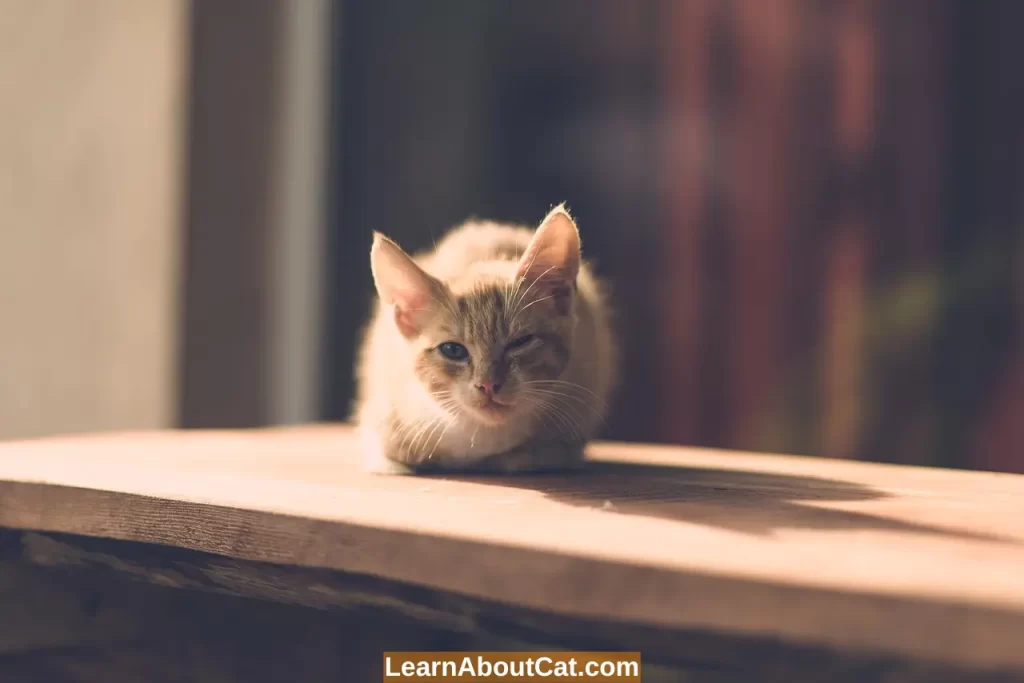
Why Is My Cat Squinting One Eye?
For a variety of reasons, your felines’ eyes might be painful and infected, and this discomfort may trigger your cat to squint his one eye.
Let’s investigate the causes of your cat’s frequent winking or squinting to see which are more severe alarming signs.
1. Eye Infection
Inflammation with eye infections is among the most typical ocular problems in cats. Your feline may squint his eye as a result of irritation or photosensitivity if their eye becomes red, inflamed, and puffy in this situation. In addition to these signs, you might also experience increased crying, pawing, scraping over the eye, and pale or greenish fluid from the eyes.
Both microbial (due to bacteria getting into the eye) and viral (due to viruses like cat HSV) eye infections can affect felines. According to the aetiology, several treatments are used for eye infections.
If your feline got a viral eye problem, it might be more difficult to identify and cure the underlying medical condition than it is to cure only one eye. These are the symptoms of an eye infection in cats:
- Eye and surrounding area inflammation
- Excessive crying
- Continuous eye winking or flickering
- An outwardly pointing eyeball
Also, Check Out: Why Does My Cat Blink One Eye?
2. Glaucoma
Glaucoma may develop if a cat’s eye infection is not addressed. The tear ducts of cats are utilised to secrete fluid. If your cat is unable to release it, pressure increases. As a result, your cat suffers and is unable to open its eyes.
Treatment for glaucoma must begin as soon as symptoms emerge. If left untreated, glaucoma might lead to the loss of one eye. The warning signs of this illness include:
- Pupils dilated
- An iris with cloudiness and discolouration
- Swelling in eye
- Discharge that is thin and watery
- Pawing and clawing at the eye
3. Allergies
Aside from squinting, your cat may also be allergic, as seen by one eye being closed. Your cat may have stinging, itchy, and watery eyes if they are allergic to anything, just like people do. As a result, they could begin to blink or squint excessively.
For cats, frequent allergies include odours, food, fleas and other parasites, household cleaners, and pollen. Sneezing, wheezing, and skin itching are all typical symptoms of your cat having an allergy to one of these things. Depending on the allergies, cats might occasionally have vomiting or swollen paws.
Interesting Reading: Why My Cat Has Scabs on Its Neck But No Fleas?
4. Dry Eye
When your feline is suffering from the dry eye which is also called keratitis sicca, their eyes don’t generate sufficient fluids to make them adequately hydrated. Your feline may keep one of its eyes closed as a result of this dehydration making its eyes itchy and unpleasant.
Additional symptoms of KCS in cats include frequent squinting, yellow mucous, and dull-looking eyes. This syndrome may develop as a complication of other illnesses, such as the virus herpes. To identify this disease and administer drugs as necessary, your veterinarian can carry out some tests.
5. Cataracts
Age-related cataracts in senior cats are a natural occurrence. Cataracts prevent the retina from receiving light. A cat’s vision is hampered by this, resulting in blindness.
Cats who have cataracts can still survive. Your cat will use its extra senses to learn about its surroundings. Cataracts can be removed surgically.
6. Conjunctivitis
Your cat’s eye will enlarge, get red, and become inflamed. Since this would sting, your cat could claw and scrape at its eye. Conjunctivitis can harm both eyes. Possible causes include allergies or an infection from another cat.
Cat conjunctivitis is treated with anti-inflammatory eye medications. The majority of the time, cats will totally recover in two days of therapy.
7. Strange Objects
Another potential reason for your cat’s closed eye is the possibility of foreign objects becoming stuck. Because cats seldom blink, it is more likely that something will get trapped in their eyes. Typical items that might become trapped in your cat’s eyes include small stones, grit, hair, and fur clumps.
Your cat may also paw at its eye and wipe its face on the floor in an effort to remove any foreign objects that may be present. Children may also weep excessively and have swollen eyes.
8. Entropion
Entropion, in contrast to the other causes of eye closure in cats, is a hereditary disorder. An inverted eyelid that folds inward against the eyeball is present in cats with entropion.
They could experience discomfort from their eyeball rubbing against their eyelashes and hair. In the end, this might lead to blindness and corneal ulcers.
Cats frequently squint, keep their eyes closed, and on rare occasions, pus or mucus may even be pouring from within their eyes. Persians and other short-nosed cat breeds, notably Himalayan and Burmese cats, are most frequently afflicted
9. Uveitis
Additionally, if the uvea or other tissues inside your cat’s eye become inflamed, they could suffer from extreme pain and misery.
The uvea is divided into three sections:
The iris, a spherical section of the eye; the ciliary body, a part of the eye wall that secretes fluid; and the choroid, the eye’s primary layer, all contribute to the colour of the eye.
If your cat develops uveitis, one or more of these uveal structures will be inflamed. This might be caused by a number of different medical disorders, such as high blood pressure, diabetes, ocular trauma, chemical irritants, or infections.
10. Ocular Ulcers
Cats’ corneas are susceptible to ulcers and infection. The following symptoms of corneal ulcers are typical:
- Significant ocular discharge.
- There is a clear film covering the eye.
- The cat closes one eye while in a bright setting due to its sensitivity to light.
- Ulcers may be brought on by trauma or infection.
11. Blepharitis
Blepharitis is the name for chronic inflammation of the eyelid. The issue will initially manifest as irritation, which might be brought on by an insect bite or a foreign object that got lodged. Your cat’s eyelid will start to swell, flake, and perhaps start to exude pus. The eyelid of a cat will also significantly expand. This will quickly prevent the cat from opening its eye.
Treatment for blepharitis is frequently done at home. A cotton pad should be placed close to the cat’s eye and left there for 15 minutes. The edema will start to lessen with daily repetition.
Interesting Reading: Can You Use Human Eye Drops on Cats?
12. Visible Ocular Edema
Pawing and scratching at the eye causes an increase in pupil size, a thin, watery discharge, and a discoloured, hazy iris.
How Can I Prevent Eye Problems in Cats?
Since there are so many potential causes of cat eye problems, it is almost impossible to halt them. You may take a number of steps to assist in preventing serious eye diseases, though.
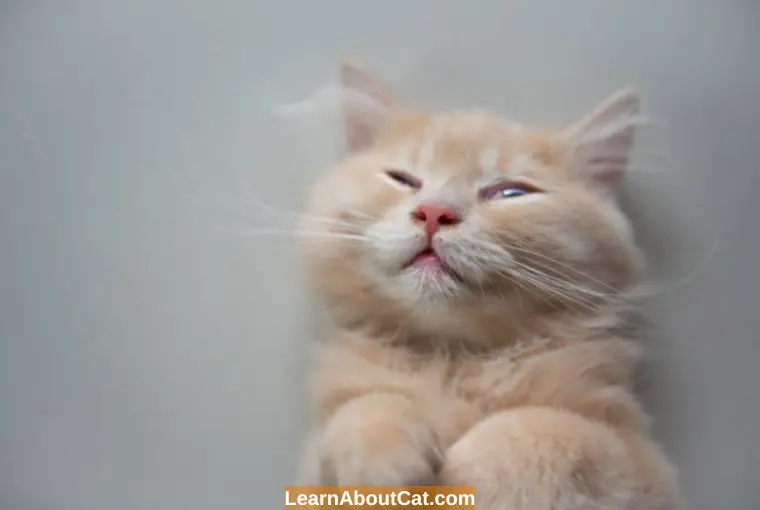
- Annual immunisation against feline herpesvirus and feline calicivirus helps protect against cat flu, which can cause conjunctivitis.
- Since the Chlamydophila Felis bacteria is one of the main causes of conjunctivitis, have your cat immunised against it.
- The feline leukaemia virus can affect your cat’s immune system, much like it can attack human immune systems, weakening it and raising the risk of infection, inflammation, and other eye issues. Therefore, be sure to provide this vaccination when needed.
- Keeping your cat indoors may lessen their exposure to eye dangers, such as tiny stones and grit that might become stuck, other cats that they could fight, or abrasive surfaces like prickly plants, aside from immunizations. Also, make sure to remove anything sharp from your home that might damage your eyes.
- Certain causes may cause a cat of any breed or age to have one eye closed. However, due to their unusual skull shapes and large skin folds, brachycephalic cat breeds, including Persian, Himalayan, British Shorthair, and Burmilla cats, may have a higher prevalence of several eye diseases. So, avoid these breeds.
How Can I Remove Foreign Objects Out of a Cat’s Eye?
Cats don’t blink much; thus, unexpected objects becoming caught are common. There are various signs that a cat has something in its eye, including:
- Scraping the cornea.
- Puts its head down on the floor.
- Crying too hard and squinting.
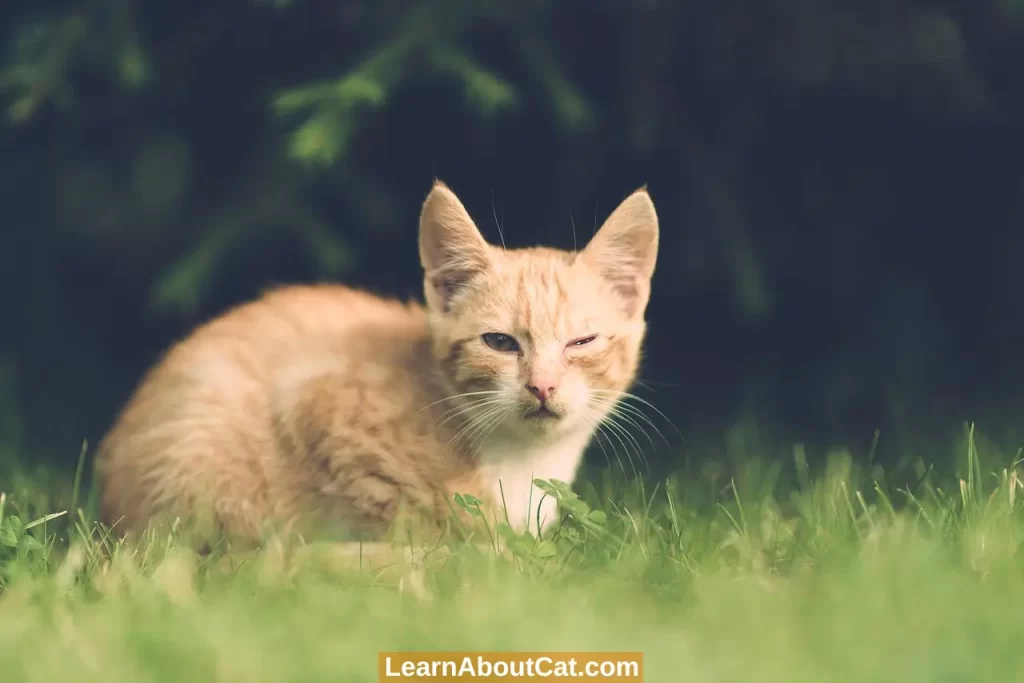
The following tangible things might be caught in a cat’s eye:
- Grit and dust from stones growing fur or hair.
- Wash away any foreign objects that may be in your cat’s eye. Blend some warm water with some saline solution. Never attempt to remove anything with tweezers. Cats are cautious with their look. Your cat will shake, which might damage them.
- Red rings around the eyes are uncommon in cats. Your cat may have had a minor eye injury, such as a prick. Your cat may have trodden on a branch or scratched itself while being brushed.
- If the injury is minor, it will recover quickly. Your cat will act normally the rest of the time and blink a little bit more. After one to two hours, the redness will start to fade.
- One of my cat’s eyes blinks more frequently than the others. Sometimes cats will blink. Without your knowledge, your cat could blink. This alone does not constitute cause for concern. Your cat was, however, blinking one eye.
- Expressing devotion by removing a foreign object that has become stuck in its eye.
My Cat Sleeps With One Eye Open; Why?
Cats are naturally watchful animals, so they feel vulnerable while they’re sleeping. Even if you seem to be asleep, your cat’s eye can be awake. The nictitating membrane, or translucent third eyelid, is unique to cats. This is situated directly beneath the conjunctiva, close to the corner of your cat’s eye.
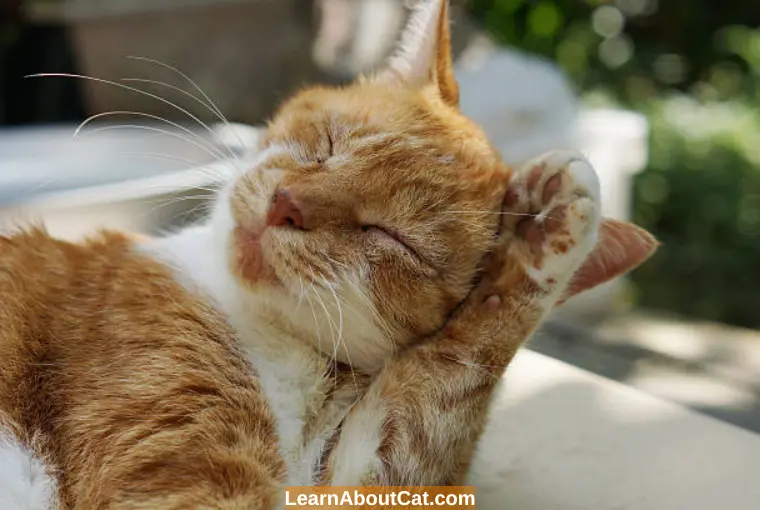
When your cat is sleeping, this eyelid shuts. This enables your cat to snooze while being on the lookout for danger. If your cat sees movement, it might react quickly. Maybe your cat isn’t taking a nap. According to Experimental Neurology, when a sleeping cat enters REM sleep, its eyelids will flicker.
What To Do When the Cat Is Squinting One Eye?
It’s critical to rule out any probable causes of your cat closing one eye. However, you should be aware of what to do to address the situation and prevent any long-term harm if you detect your cat blinking in just one eye.
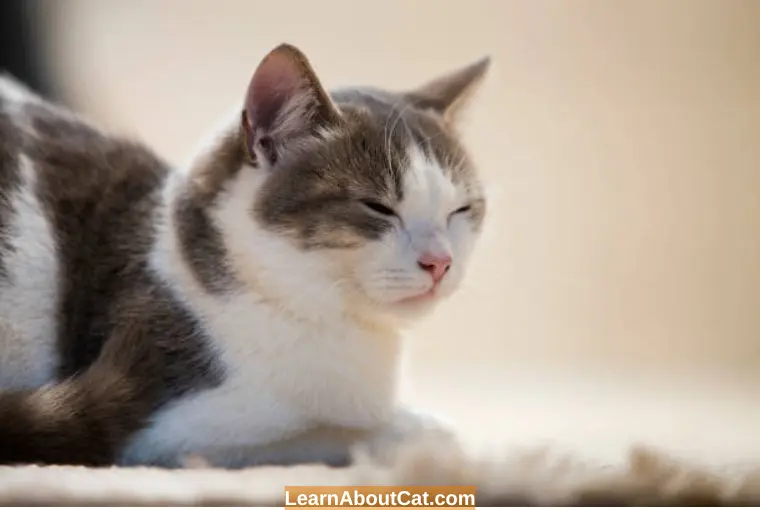
1. Go to the Vet
Take your cat to the doctor if you notice that they are blinking or squinting a lot or if they are keeping one or both eyes closed.
Because the eyes are delicate organs, eye illnesses may cause irreversible damage and blindness if they are not treated effectively, swiftly, or with enough care.
Even if you know your cat has a simple eye problem, such as grit, that can be cleaned from the eye with saline solution, it is still advisable to go to your veterinarian. If this grit even produces a tiny scrape on your cat’s eye’s surface, it can spread infection or deepen and degenerate.
Don’t try to force your cat’s eyes to open, either. Pushing their eyes wide might compound the injury and worsen it, even if you are attempting to observe whether they are displaying any symptoms, like a red eye. Your veterinarian is the best person to accomplish this safely and without putting the animal at risk.
2. Give Home Care
You can do your part to make sure your cat receives the proper at-home treatment after you return from the clinic or before you get a chance to bring them there. This will aid in the recovery of the eye condition and stop it from growing worse.
Although wearing a pet collar may not be something your cat enjoys, it is the best method to prevent them from scratching their eyes and lowers the likelihood that they will aggravate any illnesses or injuries. This is a great way to stop the injury from worsening before you take your cat to the vet and keep it safe once treatment has started.
Keep any discharge from your cat’s eye or eyes cleaned away as well. You may carefully wipe away the filth with a clean, damp cloth while moving outward from the inner corner.
3. Make Your Home’s Surroundings Better
You may make things better for your cat by enhancing its living area.
Make careful to segregate this cat from the other cats in the home if you have many of them. First off, if your cat is covering one eye because it has a condition like conjunctivitis, it is contagious. If you don’t want any of your cats to get sick, it’s best to keep them separate. Additionally, if your cats are playing together, there is a higher chance that the injury may be bumped and result in further damage.
Be careful to eliminate all bright lights from the area and maintain a dark lighting level. Bright lights may be quite unpleasant for cats that have ocular conditions.
Cat Breeds Most Prone to Eye Problems
The breed of your cat might affect any eye issues. The Australian Veterinary Journal claims that cats with brachycephaly are more prone to have eye problems. These breeds include:
- Shorthair in Europe.
- Burmilla.
- Exotic shorthair.
- Himalayan.
- Munchkin.
- Persian.
- Mountain Fold.
- Xavier Selkirk.
Brachycephalic cats have unusually formed skulls. Their skulls are more rounded and shorter. The folds in their skin can capture odd objects. These cats’ eyes also have a difficult time producing tears, which causes the eyes to dry up and swell up.
Frequently Asked Questions
Does squinting mean a cat is in pain?
Squinting in cats might indicate discomfort or irritation. If your cats show squinting behaviour, examine them because this behaviour typically indicates a problem with the eye’s health. It may be possible that your feline is in discomfort if its pupils are expanding or contracting.
Should I worry if my cat is squinting one eye?
Your cat may suffer from an eye problem if it squints his eyes. A variety of microbial, viral, fungal, and parasitic disorders can cause infections. Cats’ respiratory issues can result in eye problems.
As a result of eyes squinting, your cat may become red/swollen and produce secretion, sneeze, and nasal congestion. In that case, you must take your feline to the vet for proper treatment.
Can cat allergies affect only one eye?
Following veterinarian-prescribed medication, many uncomplicated symptoms of conjunctivitis recover in 7-14 days, while chronic infections need extended medication and may take several weeks to even months.
Can cat allergies affect only one eye?
It can be possible that both eyes get affected due to allergies. Allergy symptoms may often be followed by a sneeze, a runny nose, or phlegm. It is feasible that a small bit of an irritant may enter from one eye to another and causes allergies in both eyes; however, this is quite uncommon.
Why My Cat’s Eyes are Red Around the Edges?
Cats with redness around their eyes’ edges may experience slight eye trauma, like getting an eye poked. It’s likely that when brushing, your cat rubbed against a twig or hurt itself. When trauma is minor, it typically heals on its own. Around 1-2 hours, the inflammation will decrease.
But if that’s not true, then it’s most likely that your feline is suffering from conjunctivitis or an illness.
Can I Give My Cat Human Eye Drops?
Don’t apply human eye solutions to cure your feline’s eye problems. You must consult a vet as soon as possible if you observe any infections or problems in your feline’s eyes.
Your vet will recommend the most appropriate treatment option for your feline after doing the proper diagnostics.
Final Thoughts!
Seeing your cat with one eye closed may be disconcerting. The eyes are delicate organs that require careful maintenance. But the best course of action is to keep your cool, watch your cat’s eyes and behaviour, and get to the vet as soon as you can.
Conjunctivitis is likely to be the most frequent cause; nevertheless, it is easily curable and not a reason for alarm. With the correct treatment, even more significant issues may be easily managed. If you provide your cat with a cosy environment and take prescribed medications as directed, they will rapidly feel pleased, healthy, and like their mischievous selves again.
Who is Isabella?
My name is Isabella, and I am a dedicated and knowledgeable cat enthusiast. With years of experience caring for cats and a deep love for felines, I made a mission to help other cat lovers navigate the challenges of cat ownership.

